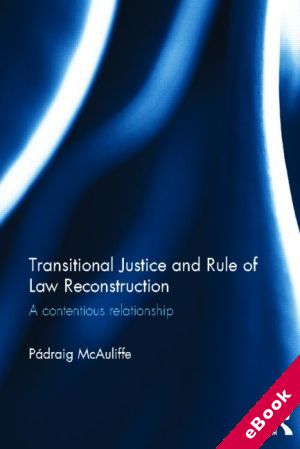
The device(s) you use to access the eBook content must be authorized with an Adobe ID before you download the product otherwise it will fail to register correctly.
For further information see https://www.wildy.com/ebook-formats
Once the order is confirmed an automated e-mail will be sent to you to allow you to download the eBook.
All eBooks are supplied firm sale and cannot be returned. If you believe there is a fault with your eBook then contact us on ebooks@wildy.com and we will help in resolving the issue. This does not affect your statutory rights.
This book examines the interaction of transitional justice and rule of law reconstruction projects in post-conflict societies, the dilemmas it brings and possible solutions. Though the ordinary presumption is that the two processes should be mutually reinforcing and complementary, practice in the last twenty years has demonstrated under-appreciated and under-analysed discontinuities and contradictions in states where both have been attempted.
This book traces the diverging development of both rule of law reconstruction and transitional justice since the end of the Cold War, demonstrating how the domestic formal justice system which is at the centre of rule of law reform has been by-passed by methods which do little to develop national institutions and which can corrode their cultural legitimacy. The book then goes on to examine how transitional trials in international, domestic and mixed/hybridised courts can detract from, or complement, on-going processes of justice sector reform. Finally the book considers the use of alternative justice mechanisms in transition. It examines the dangers and opportunities of circumventing the formal justice system by using measures such as conditional amnesties, truth and reconciliation commissions and traditional or local justice mechanisms which may not have long-term application or analogues in the reforming justice sector.